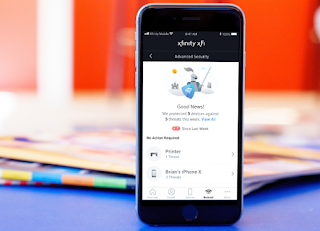Comcast launched a new artificial-intelligence-powered service that monitors, blocks and informs customers of online threats to connected devices, and provides seamless digital protection for those devices when connected to their home network's Xfinity Advanced Gateway.
 The new Xfinity xFi Advanced Security service is powered by Cujo AI, a start-up based in Mountain View, California. The platform uses AI and machine learning technology to monitor and analyze WiFi traffic in the home, and will automatically block identified suspicious activity in real time.
The new Xfinity xFi Advanced Security service is powered by Cujo AI, a start-up based in Mountain View, California. The platform uses AI and machine learning technology to monitor and analyze WiFi traffic in the home, and will automatically block identified suspicious activity in real time.
“As the digital world gets more complex, we wanted to make it simple and easy for our customers to protect their home networks. That’s why we developed xFi Advanced Security,” said Fraser Stirling, Senior Vice President of Digital Home, Devices and AI, Comcast Cable. “We want to give customers digital peace of mind for the devices they already own and the confidence to expand and evolve their connected homes knowing that every new camera, voice-assisted speaker or smart thermostat they add will be protected.”
The service is available for $5.99 per month, and is also available as part of a package in some markets.
 The new Xfinity xFi Advanced Security service is powered by Cujo AI, a start-up based in Mountain View, California. The platform uses AI and machine learning technology to monitor and analyze WiFi traffic in the home, and will automatically block identified suspicious activity in real time.
The new Xfinity xFi Advanced Security service is powered by Cujo AI, a start-up based in Mountain View, California. The platform uses AI and machine learning technology to monitor and analyze WiFi traffic in the home, and will automatically block identified suspicious activity in real time.“As the digital world gets more complex, we wanted to make it simple and easy for our customers to protect their home networks. That’s why we developed xFi Advanced Security,” said Fraser Stirling, Senior Vice President of Digital Home, Devices and AI, Comcast Cable. “We want to give customers digital peace of mind for the devices they already own and the confidence to expand and evolve their connected homes knowing that every new camera, voice-assisted speaker or smart thermostat they add will be protected.”
The service is available for $5.99 per month, and is also available as part of a package in some markets.




















